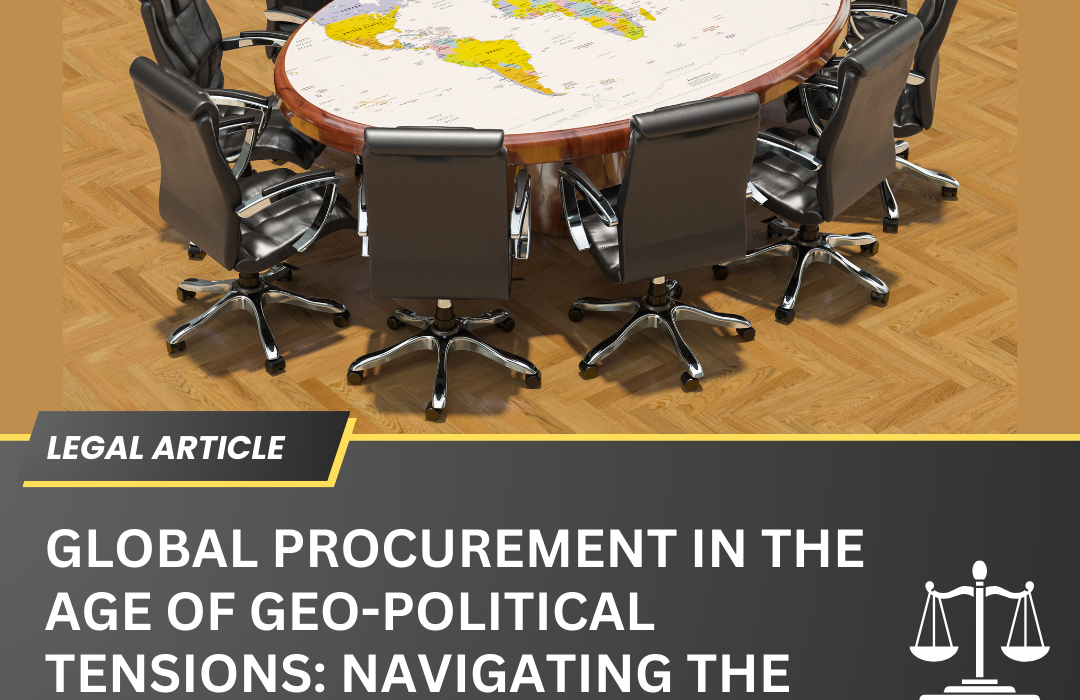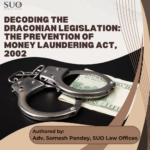GLOBAL PROCUREMENT IN THE AGE OF GEO-POLITICAL TENSIONS: NAVIGATING THE LEGAL RISKS
Introduction
To say that we live in a world marked by uncertainties and marred by conflict won’t be an understatement in the slightest. In the present day and age where multiple countries are grappling with challenges like wars, civil unrest, and collapsing governments, there is not a single aspect of life which has remained untouched. Whether you’re sitting in India or Brazil, these events are bound to affect you in one way or another. One of the most affected aspects in light of the present landscape, however, is the global business scenario, which in turn impacts procurement, supply chains, trade, and market access. But what exactly is procurement? To put it simply, it is an activity which entails the purchase of goods, services, and other works from an external source. Premised on cost-effectiveness, it has a significant impact on the operations of a company. This brings us to the next question: “How do geo-politics affect procurement and supply chains anyway?”
To answer these questions, the present article aims to delve into impact of geo-political tensions on the global procurement landscape, including tariff wars and trade sanctions; while simultaneously shedding light on the possible cost and risk mitigation strategies to navigate the same.
How Geo-Political Conflicts Impact Global Procurement
In an era of globalization where economies across the world are becoming increasingly inter-connected, it becomes important for business owners to stay up-to-date with the geo-political trends as it would help them become better equipped in navigating the repercussions on procurement, supply chains, and trade operations at a global level. To understand thedomino effect of region-specific geo-political tensions on the global landscape, let’s start by looking at the case of Europe in light of the ongoing Russo-Ukrainian conflict. When crisis struck in February 2022, the supply of natural gas and other essential commodities across Europe was severely hampered due to the imposition of sanctions, and the presence of other similar handicaps. Companies whose operations were centred on such commodities were constrained to negotiate their contracts or turn to alternative supply channels. Other significant impacts at the time included skyrocketing prices, shortage of raw material, overall supply chain disruptions, logistics-related issues, and many others. Similarly, Brexit and the Covid-19 pandemic also had long-lasting impacts on various economies across the world, which can be felt even to this day. At this juncture, it becomes important to acknowledge that these situations have the biggest impact consumers and companies, especially the ones involved in global supply chains. Some of the very few challenges faced by businesses in the realm of procurement are increased costs, reduced imports, supply chain disruptions, and economic burden on exporters. In light of the same, the only remedy available to such businesses is to devise appropriate strategies to recover from these blows. Some of the most prominent examples of situations arising due to geopolitical tensions, and subsequently affecting global procurement have been elaborated upon as under.
Tariff Wars are occurrences which are nothing new. Fluctuation in tariffs has been a strategy which has been employed by governments time and again in an attempt to manage domestic industries, trade imbalances, and unfair trade practices. However, the imposition of tariffs and the waging of so called trade wars has become all too common at this point, owing to the volatile geopolitical landscape. Perhaps, the most relevant instance of the same would be the tariff wars between the United States and China, which go back to 2018.
Imposition of Sanctions is another tool which is often used by governments to pressure nations to comply with certain demands, or with international law as a whole. It encompasses various aspects, including economic, financial, trade restrictions. Recent examples of nations facing sanctions would include Russia, Iran, North Korea, and Syria. Though it is used in retaliation against unlawful activities, it has a ripple effect on global procurement and supply chains, including increased costs and delays in availability and delivery of products. Sanctions particularly have an adverse impact on businesses engaged in international trade, and lead to loss of reputation and imposition of hefty penalties in the event of non-compliance. Hence, it becomes crucial to understand, and adhere to relevant export control laws.
This goes on to show the far-reaching impacts of geo-political crises on the global procurement scenario, irrespective of the industry; and takes us to the next segment of this article, which talks about the legal risks arising out of these two heavily intertwined domains.
Legal Risks associated with Global Procurement & Strategies for Effective Mitigation
The realm of global procurement is rather complex (even more so due to ever-increasing global tensions), and is marked by various legal and regulatory compliances such as international business laws, foreign policies, co-operation treaties, and trade regulations, to name a few. In light of the same, it is crucial for businesses to look out for legal risks which have lasting effects on operational efficiency of the business. The first and perhaps the most important would be contractual ambiguities, including lack of clarity in key clauses like termination and force majeure which have the potential to deter the enforcement of such contracts in the event of geo-political conflicts, thus making them untenable. It also leads to the imposition of unfair costs on affected parties due to tariff fluctuations and embargoes. Another possible risk is that of non-compliance with sanctions & embargoes, which is particularly critical to navigate for businesses operating in multiple markets. More often than not, such non-compliances are inadvertent in nature, they have the potential to severely hamper the reputation and finances of the entity due to the levy of often hefty penalties. Other risks include the violation of labour and human rights while undertaking sourcing/ procuring human resource from certain countries; along with infringement/ theft of intellectual property in countries having weak IP enforcement laws.
Now that we have taken a look at the ripple effect caused by geo-political conflicts in the realm of procurement, along with the possible legal risks which one may encounter in the course of their trade and/ or business activities; it would only be fitting to take a look at the strategies which may be adopted and employed by businesses on a case-to-case basis in an attempt to minimize the losses effected due to international conflicts of varying degrees.
The first and perhaps the most common strategy employed herein would be conducting geopolitical risk analyses, and keeping an eye out on the politico-legal developments in countries of origination of supply chain. Other preferred methods for risk mitigation would include the enforcement of contracts having in place robust clauses pertaining to the pricing mechanism, force majeure, the termination of contract in a way which safeguards the interests of all stakeholders involved, and dispute resolution mechanism. Further, it is also highly recommended to conduct due diligence and thorough background not just on the business partners, but also on the political and economic environment of the relevant countries. Make sure that you and the suppliers are in compliance of relevant laws and regulations, and aren’t subject to any sanctions or embargoes. Lastly, sound legal advice, though may sound obvious, goes a long way in ensuring that you’re in the clear, with no handicaps to obstruct your operations or worse, add to your plight arising out of international conflicts.
Conclusion
To conclude, it can be said that the global procurement scenario is as volatile as it can get, thanks to the rapidly evolving and rather unpredictable geo-political landscape. If businesses wish to stay afloat in this day and age, it becomes imperative for them to up their game and effectively navigate the challenges presented by virtue of supply chain disruptions. By mitigating risks in a way that is legally compliant and doesn’t leave much room for heavy losses, businesses can plan their strategic growth and expansion, while also harbouring the ability to seize the right opportunities at the right time. By enforcing strong contracts, diversifying supply chains, and making the right business choices backed by sound legal advice. Not only will these measures solidify their footing in the market, but also help them proactively combat the risks instead of merely reacting to crisis.
Authored by:
Priyamvada Lonial, Advocate
Legal Associate, SUO Law Offices



